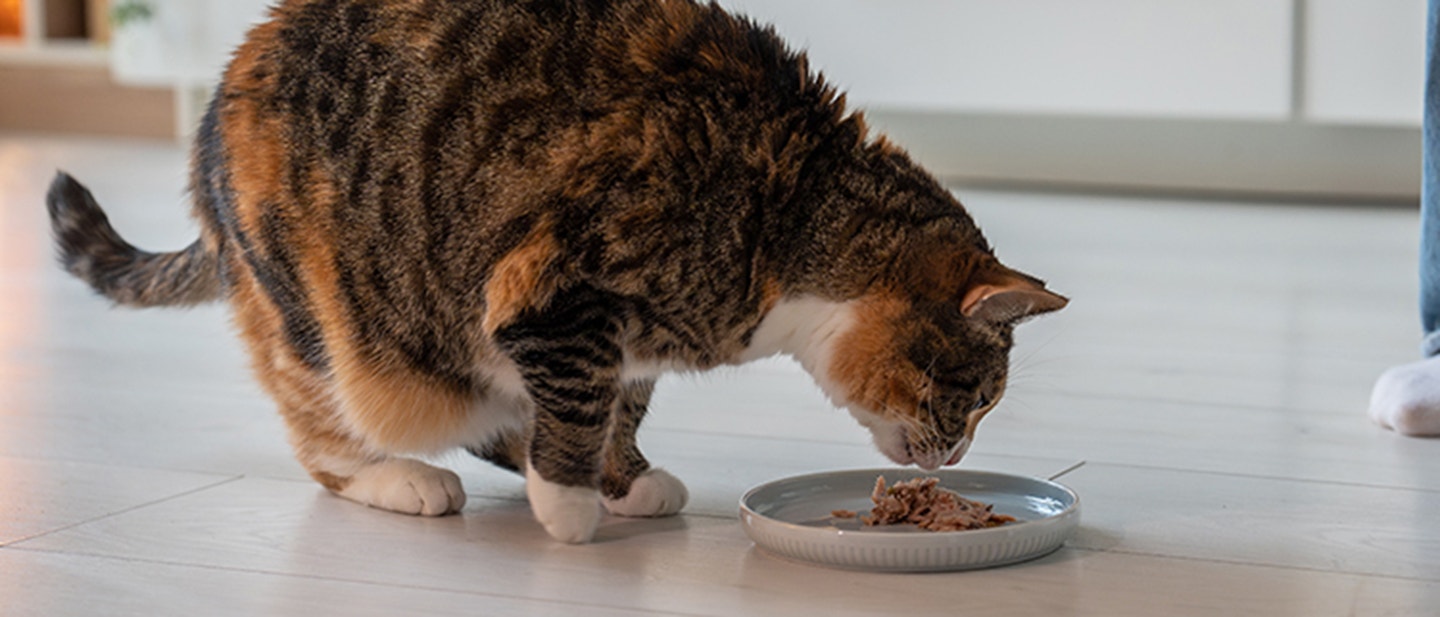
CAN CATS EAT TUNA?

Article checked by a vet
Is tuna bad for cats and can you feed cats tuna regularly?
Can cats eat canned or tinned tuna?
Tinned or canned fish must only be given to a cat if it is prepared in a way which will prevent upsetting the cat's stomach, so be wary of the labels when buying tuna. Canned and tinned tuna is often packaged in brine, oil or spring water. There can be high sodium levels in the brine or oil, which can cause stomach upset as your cat will struggle to digest it. Ultimately, cats have very different nutritional requirements to humans, so it is not a good idea to give your cat lots of human food. We suggest sticking to formulated dry or wet cat food, which provides a complete and well-balanced diet which has been formulated to keep your cat healthy and strong.
Do cats like tuna?
Tuna has a strong aroma which attracts cats and the flavour of tuna makes it even more appealing to our feline friends. Cats can be adept at getting their own way when they want something. The strong smell of canned tuna can be deliciously alluring, so make sure your tuna is secure from prying paws.
Looking for a way to diversify your cat's diet? Introducing canned tuna into their diet is a great way to do this, however, it is best to start with small amounts of tuna to test if it agrees with your cat's stomach.
Make sure to double-check what type of canned tuna you are treating your cat to, if available, low salt options should be considered and in general, processed seed oils and brine are not good for your cat. Tuna canned with spring water with no added seasonings or additives is the safest option and all others should be avoided.
Feeding canned tuna in brine to my cat
Can cats eat tuna in brine? No, tuna in brine contains high levels of sodium which can be toxic for cats and could cause electrolyte imbalance in your cat’s body and serious dehydration. It is best to avoid feeding your cat tuna in brine.
Feeding canned tuna in sunflower oil to my cat
Can cats eat tuna in sunflower oil? No, it is best to avoid feeding your cat tuna which has been canned in sunflower oil. Sunflower oil can cause serious gastrointestinal issues, stomach upset and diarrhoea in your pet.
Feeding canned tuna in olive oil to my cat
Can cats eat tuna in olive oil? Although olive oil is not toxic to cats, the fat content could cause stomach upset (diarrhoea and vomiting). We advise avoiding tuna in olive oil too.
Feeding canned tuna in spring water to my cat
Can cats eat tuna in spring water? Yes! This is the safest canned tuna to feed your feline and the only one we recommend using in moderation, to treat your pet or diversify their diet. Remember to check there are also no added seasonings or additives.
Feeding canned tuna mayonnaise to my cat
Can cats eat tuna mayonnaise? No, you should avoid feeding your cat canned tuna mayonnaise. Other ingredients and additives such as salt, pepper or onion powder could be included and can be very harmful to cats. Mayonnaise itself is not toxic to cats however they are lactose intolerant, so it can cause diarrhoea and vomiting.
Feeding canned tuna with vegetables to my cat
Can cats eat tuna with vegetables? No, we do not recommend feeding your cat canned tuna with vegetables as it may contain ingredients and additives such as salt, pepper or onion powder and these can be very harmful to cats.
Canned tuna often comes brined with additional ingredients, oils or seasonings which can be harmful to cats, fresh or canned tuna in springwater are the best options for you if you want to treat your cat!
It is important to note that tuna also contains very high levels of mercury which can be toxic if it is ingested in large quantities, leading to sickness in cats. Albacore tuna has, on average, 3 times as much mercury as other species of tuna and this type of fish should be avoided at all costs, so always check the labels on canned and fresh tuna before feeding it to your cat. Remember that any tuna must only be given in small amounts as an occasional treat.
Salmon
Salmon is packed with omega-3 fatty acids which promote heart health and brain function. Omega-3 fatty acids also work to protect the immune system and can help improve coat and skin health. Salmon also contains lots of potassium which helps regulate body functions.
Cod
Cod contains less fat than other types of fish making it a healthy source of protein. It also contains high levels of omega-3 fatty acids and vitamins such as vitamin B12 which supports the immune system.
Trout
Trout is also a good source of omega-3 fatty acids for cats, fatty acids help promote a healthy immune system and can improve coat and skin health.
White fish
Whitefish generally contains less fat than other types of fish making it an excellent source of lean protein for cats but they may not contain as much omega-3 as other types of fish such as salmon.
Mackerel
As well as being packed full of omega-3, mackerel is also a great source of selenium which can help improve skin and coat health, joint health and your cat’s immune system.
Sardines
Sardines have the lowest levels of mercury found in any fish. They also contain the same high levels of fatty acids and protein, as well as taurine which supports overall bodily function.
Anchovies
Anchovies are a good source of omega-3 fatty acids and protein for cats, they also contain phosphorus which can help cell and tissue repair.
Can you feed cats tuna
Ultimately, cooked fresh tuna is a great addition to your cat’s regular diet of wet or dry food as an infrequent treat in small amounts! However, tinned tuna can be trickier and you should only feed your cat tuna that has been tinned with spring water. Feeding your cat tuna in anything other than spring water should be avoided to make sure you do not cause any stomach upset or health issues.
